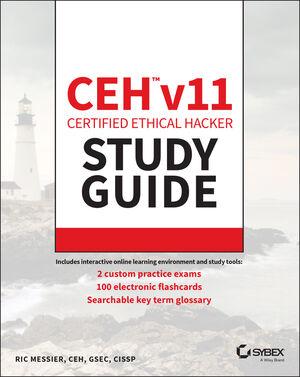CEH v11 Certified Ethical Hacker
Certified Ethical Hacker CEH v11 book will teach you the latest commercial-grade hacking tools, techniques and methodologies used by hackers and information security professionals to legally hack into an organization.
In order to maintain the high integrity of our certification exams, EC-Council exams are provided in multiple forms (i.e. different question banks). Each module is carefully analyzed via beta testing with an appropriate sample group under the supervision of a committee of subject matter experts who ensure that each of our exams not only have academic rigor, but also have real-world applicability. We also have a process for determining the difficulty of each question.

Individual assessment then contributes to an overall cut score for each exam module. To ensure that each module has the same grading standards, reduced scores are set on a “per exam module” basis. Depending on the contested exam form, cut scores can range from 60% to 85%.
About The CEH v11 Exam
- Number of Questions: 125
- Test Duration: 4 Hours
- Test Format: Multiple Choice
- Test Delivery: ECC EXAM, VUE
- Exam Prefix: 312-50 (ECC EXAM), 312-50 (VUE)
CEH v11 provides a deep understanding of the ethical hacking phases, various attack vectors and preventive countermeasures. You will learn how hackers think and act maliciously so that you can better set up your security infrastructure and ward off future attacks. Understanding system weaknesses and vulnerabilities helps organizations strengthen their system security controls to minimize the risk of an incident.
CEH v11 is designed to incorporate a practical environment and systematic process across all areas and methods of ethical hacking, giving you the opportunity to work on demonstrating the knowledge and skills necessary to practice the Work of an ethical hacker are required. You will face a very different attitude towards the responsibilities and actions required to be safe.
Who the CEH v11 course for:
- Network Administrators and Engineers
- System Administrators
- Information Security Professionals
- Risk / Threat/Vulnerability Analyst
Prepare for CEH certification and learn to think like a hacker by looking for weaknesses and vulnerabilities in your system.
This course will help you master an ethical hacking methodology that can be used in penetration testing to legally assess system security. This course provides you with the desired ethical hacking skills, preparing you for the internationally recognized Certified Ethical Hacker (312-50) certification exam from the EC-Council.
EC Council security experts have designed more than 140 laboratories that mimic real-time scenarios to help you “survive” the attack as if it were real. You’ll also get access to over 2,200 commonly used hacking tools to immerse you in the world of hackers.

About CEH v11 Book
As information protection is a growing concern for businesses today, IT security certifications have become very desirable, although the number of certifications has increased. Now you can differentiate yourself with the certification as a Certified Ethical Hacker (CEH v11). The CEH Certified Ethical Hackers Study Guide v11 provides a complete overview of the CEH certification requirements with short, easy-to-understand instructions. The chapters are organized by exam objective, with a handy section that maps each objective to its appropriate chapter so you can track your progress.
The text provides extensive coverage of all subjects, along with challenging chapter review questions and the Essential Exam, a key feature that identifies critical areas of study. Topics include common attack practices such as reconnaissance and scanning. Topics such as intrusion detection, DoS attacks, buffer overflows, wireless attacks, mobile attacks, Internet of Things (IoT) and more are also dealt with.
This study guide goes beyond exam preparation, it offers practical exercises to strengthen life skills and real scenarios that put what has been learned in the context of real professional roles.




![9 Interesting Mobile Phone Facts [Infographic]](https://technofaq.org/wp-content/uploads/2016/12/9-Interesting-Mobile-Phone-Facts-150x150.jpg)








